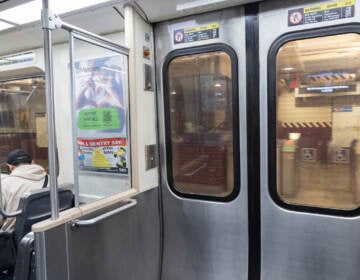January 11: Carousel history | City compost | Street design and equity

GroJLart unearths the history of G.A. Dentzel Carousel Company at Broad Street, Erie and Germantown avenues. Dentzel, a German immigrant, hired master Italian and German sculptors and established what would be called the “Philadelphia Style” of carousels, carving the whole animal kingdom in extraordinary detail. The Please Touch Museum’s Dentzel carousel (above) was built for Woodside Park in 1909.
At the northwest corner of North Broad and Spring Garden, Parkway Corp. is planning a new mixed-use complex designed by BLT Architects. Curbed has the rendering.
Dan McQuade toasts the Palestra’s 90th birthday. The basketball gym is so beloved, so storied, that this weekend after Penn State lost a “home” game at the Palestra, coach Tom Izzo actually offered his apologizes “to this magnificent facility.”
Philly has proudly and historically been a beer city – and now PhillyMag reports we have another first to add to our resume: “Philly Loves Beer is the country’s first (and only) non-profit organization dedicated to the love and greater glorification of beer that’s not linked to a brewing guild or business association. It exists to ‘serve as the foremost authority on beer and beer culture in Philadelphia and the surrounding area,’ and will do so through education, advocacy and networking 365 days a year–not just during the annual Philly Beer Week bachanal.”
In the race to reduce waste, municipal composting is the next frontier, reports The Christian Science Monitor. Milwaukee just launched its pilot program. Could Philadelphia be the next? Philadelphia Citizen looks in depth at Ottawa’s composting program and considers Philly’s possibilities. Tim Bennet of Bennett Composting, a local composting service, points out the need for regional facilities to handle any large-scale initiative. “Bennett cites the Wilmington Compost Facility, which when opened was set to be the primary composting facility for the Wilmington area and the Mid-Atlantic in general. Opened in 2009, the $20 million facility was ordered to close doors in 2014, having vastly overestimated the amount of compost that it could process.” As we’ve recently reported, Philly has set a goal of becoming a zero waste city by 2035.
According to a new report by the National Complete Streets Coalition, a working group within Smart Growth America, “pedestrians in the United States have a higher risk of being killed by cars if they’re people of color, aged 65 or older, uninsured, or from a low-income household,” Fast Co. Design reports. Bad design disproportionately creates worse conditions for more marginalized groups, the study found and puts street design in terms of public health and equity. “Data alone isn’t always a compelling enough argument for integrating traffic-calming mechanisms in streets. But a recent ruling from the New York State Court of Appeals might add a sense urgency. In December, the court decided that New York City and other local governments could be held legally liable for failing to redesign dangerous streets, a potential boon to the complete streets cause.”
Want the best of PlanPhilly delivered to your inbox? Get our events roundup on Mondays and our news digest on Thursdays. Sign up today.
WHYY is your source for fact-based, in-depth journalism and information. As a nonprofit organization, we rely on financial support from readers like you. Please give today.






